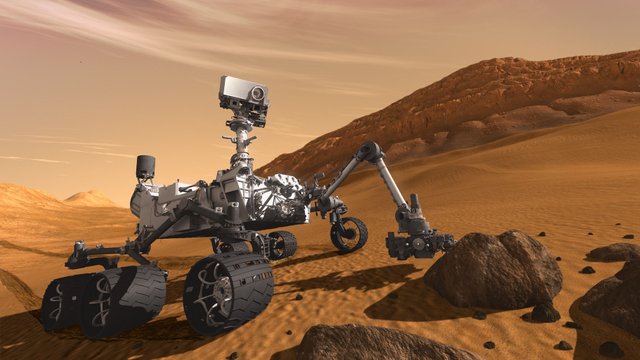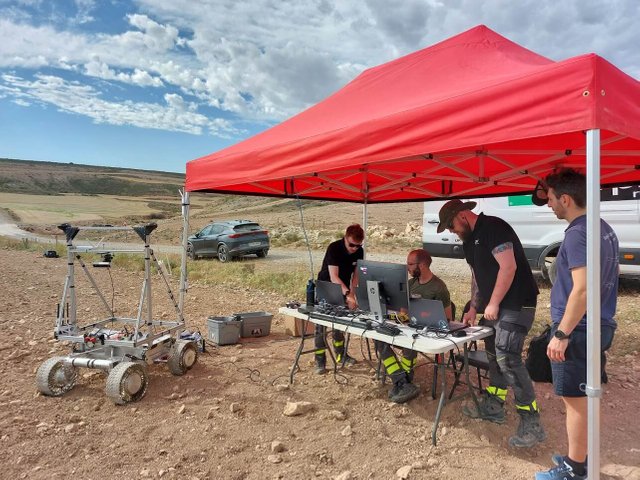FastNav, space vehicles faster than ever/FastNav, vehículos espaciales más rápidos que nunca

Source
I suppose you have all noticed the excruciating slowness of the vehicles moving on the surface of Mars, but we must not forget that these rovers are controlled from Earth. Due to the enormous distances that separate us from the red planet, communication signals take an average of twelve minutes to go and return.
Supongo que todos os habéis fijado en la lentitud desesperante de los vehículos que se desplazan por la superficie de Marte, pero no hay que olvidar que estos rover son manejados desde la Tierra. Debido a las enormes distancias que nos separan del planeta rojo, las señales de comunicación tardan de media unos doce minutos en ir y volver.
If we add to this the fact that, depending on the circumstances of the environment, the rovers have to be reprogrammed continuously, we obtain that these vehicles advance at a maximum speed of 0.13 m/s (0.5 km/h). But now this may change thanks to the Spanish company GMV and the FastNav initiative, funded by the European Space Agency.
Si a esto le sumamos que, dependiendo de las circunstancias del entorno, los rover han de ser re-programados continuamente obtenemos que estos vehículo avanza a una velocidad máxima de 0,13 m/s (0,5 km/h). Pero ahora esto puede cambiar gracias a la empresa española GMV y a la iniciativa FastNav, financiada por la Agencia Espacial Europea.

Source
The FastNav project is an innovative navigation initiative for lunar rovers. Its goal is to improve the speed and autonomy of these vehicles in complex terrain, reaching speeds of up to 1 m/s (3.6 km/h), which is an unprecedented speed for autonomous rovers on the surface of celestial bodies and represents a great advantage, since it allows rovers to travel greater distances in a single day.
El proyecto FastNav es una innovadora iniciativa de navegación para rovers lunares. Su objetivo es mejorar la velocidad y autonomía de estos vehículos en terrenos complejos, alcanzando velocidades de hasta 1 m/s (3,6 km/h), lo cual es una velocidad sin precedentes para rovers autónomos en la superficie de cuerpos celestes y que representa una gran ventaja, ya que permite que los rovers recorran mayores distancias en un solo día.
FastNav's navigation system incorporates computer vision technologies and advanced artificial intelligence algorithms, allowing the rover to detect and avoid obstacles in real time without having to stop. The system has been tested in environments that simulate the lunar surface, such as the Bardenas Reales Natural Park in Spain.
El sistema de navegación de FastNav incorpora tecnologías de visión artificial y algoritmos avanzados de inteligencia artificial, lo que permite al rover detectar y esquivar obstáculos en tiempo real sin necesidad de detenerse. Las pruebas del sistema se han realizado en entornos que simulan la superficie lunar como el Parque Natural de las Bardenas Reales en España.

Source
The FastNav project encompasses a wide range of technologies including new sensors to measure position, speed and time more accurately. More sophisticated algorithms are being created to process sensor data and estimate position more accurately, and optical communications are being investigated as an alternative to radio frequency communications, and of course artificial intelligence.
El proyecto FastNav abarca una amplia gama de tecnologías que incluyen nuevos sensores para medir la posición, la velocidad y el tiempo con mayor precisión. Se están creando algoritmos más sofisticados para procesar los datos de los sensores y estimar la posición con mayor precisión y se están investigando las comunicaciones ópticas como una alternativa a las comunicaciones radiofrecuencia y, por supuesto, inteligencia artificial.
This will position Europe at the forefront of developing critical space technologies, thereby reducing its dependence on foreign technologies in the space sector. The development of these technologies will generate new business opportunities for the European space industry. In addition, these technologies will also have terrestrial applications in sectors such as agriculture, logistics and disaster management.
Con esto Europa se posicionará a la vanguardia en el desarrollo de tecnologías espaciales críticas lo que reducirá su dependencia de tecnologías extranjeras en el sector espacial. El desarrollo de estas tecnologías generará nuevas oportunidades de negocio para la industria espacial europea. Además estas tecnologías también tendrán aplicaciones terrestres en sectores como la agricultura, la logística y la gestión de desastres.
More information/Más información
https://www.gmv.com/en-es/communication/press-room/press-releases/robotic-scientific-exploration/gmv-successfully-completes
Looks like in years to come we will have a lot of space vehicles that will be controlled actually and this is cool. Well that is great to discover about this knowledge. More and more will definitely come
Es un tema interesante, 12 minutos es una eternidad para enviar y recibir señales. Los vehículos espaciales cumplen un rol de explorador muy importante para la investigación del Universo y su orìgen.
Gracias por compartir, saludos y bendiciones.